
Dutch startup in3 has its work cut out for it. The company has just picked up a $11.1m Series A investment round with which it aims to overcome stiff competition in the increasingly crowded buy-now-pay-later (BNPL) sector. Swedish BNPL giant Klarna is aggressively expanding its services across Europe and in the States. However, in3 CEO Hans Langenhuizen believes his Eindhoven-headquartered venture has one big trick up its sleeve.

“We don’t want to put people in debt, that’s why we don’t make money out of late fees for example,” he tells Verdict.
The question of late fees and accusations of predatory practices from BNPL providers have haunted the credit industry for years. Consumer advocacy groups, such as British Citizens Advice, have warned that people using the industry’s instalments services are at risk of living beyond their means and, consequently, of being targeted by debt collectors.
It should be noted, however, that several BNPL providers have removed late fees in response to these assertions and the growing threat of stricter regulations – at least in some regions. BNPL firms also often cite their low default figures when pressured about these claims. Lawmakers and advocacy groups have, nevertheless, called for stricter rules – including introducing stronger credit checks – for companies like Klarna and Afterpay.
“[We] differ in our social responsible mission statement,” Langenhuizen says. “Where the companies you mentioned make a lot of money off people who don’t pay in time we make money off people who do pay in time. That’s because of our advanced credit engine which prevents consumers from over crediting. If you can’t afford something, you can’t buy it with in3.”
Klarna didn’t return requests for comment prior to the publication of this story.
“We take our responsibility to our customers seriously and our inbuilt protections ensure they cannot fall into a revolving debt trap,” an Afterpay spokesperson told Verdict. “We do not charge interest, automatically pause an account if a single payment is late and payment behaviour is monitored with every transaction so customers cannot spend beyond their means. We are transparent about our late fees that are capped, and globally, 98% of all purchases in FY21 incurred no late fees.”
Langenhuizen adds that this “social responsible approach” means that in3 is excited about the prospect of tougher policing of the BNPL sector, especially “on late fees and over crediting as we see this as a normal way of doing business instead of some other companies who have a different earn model.”
Langenhuizen is seemingly equally enthusiastic about the increasingly crowded BNPL industry, which is expected to keep growing to be worth $166bn by 2023, according to GlobalData’s thematic research.
“[It] makes us more aware that we are not the only one around which is healthy,” he says. “We have a strong partner approach with our payment service providers like Worldline and we believe that is key to reaching our merchants. Also we do invest a lot in our customer and merchant service where we really differ from other payment methods. We take the whole process of payment out of the hands of our customers and consumers appreciate that a lot.”
Proposed social responsibility aside, cash is still the key driver of the company’s growth and that’s where the new cash injection comes in.
in3 to expand BNPL offering
Finch Capital is no stranger to fintech companies. The UK and Netherlands-based investor has previously invested in mobile trading app BUX, tokenised real estate investment platform Brickblock and Czech Republic-based BNPL provider Twisto. So it shouldn’t be that surprising that Finch has now backed another BNPL company: in3.
The $11.1m funding round coincided with in3 launching a free BNPL service for consumers through a partnership with global digital payments company Worldline. When asked, Langenhuizen declined to offer any insight into the valuation of his company implied by the funding round.
“We cannot share,” he simply says.
However, the in3 CEO reveals that some of the money will used to fuel expansion from the Netherlands to Germany.
“[We] are also looking to explore other European countries,” Langenhuizen says. “Because our product might be complex in terms of the legislation we need to choose our countries carefully.”
Growing BNPL market
The BNPL sector, much like most of the fintech industry, has enjoyed a massive growth over the course of the pandemic.
Companies have provided instalment services for customers for over a century. However, the internet era has paved the way for a smattering of new services predominantly designed to make online shopping more convenient.
Most of these credit companies make their money charging merchants for processing transactions. As mentioned earlier, some also top up their coffers by charging late payment fees and interest on longer-term instalment loans.
National lockdowns have accelerated the trend of people taking their shopping online. Unsurprising this also created a boon for BNPL providers like Klarna and, indeed, in3.
Mastercard, Visa and PayPal have also launched BNPL services and insistent rumours suggest Apple will follow suit. It’s clear that the sector is growing.
Investors have understandably been keen to inject cash into BNPL companies. And it seems as if this trend is still going strong.
In February, French instalment-based payments provider Alma raked in $210m in debt and equity financing. Italian Scalapay followed suit a few weeks later with a $497 Series B funding round.
Earlier this week, Sequoia Capital India and STV co-led Dubai BNPL startup Tabby’s Series B extension of $54m. It also saw Lagos-based BNPL company Klump announce the close of its $780,000 pre-seed.
That said, the value of publicly-traded BNPL companies like US-based Affirm has been eroded over the past few months.
In the 12 months to November 30 2021, the 15 ASX-listed BNPL companies lost an average about 36% of their share value, as noted by The Conversation. The publication attributed the decline to looming regulatory clampdowns, concerns over the financial health of customers and the growing competition in the sector.







